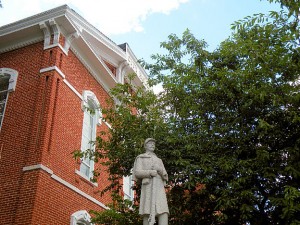A topic that required several months of discussion and numerous changes to the proposal before it was approved in 2010 needed only 11 minutes of conversation on Feb. 10 to be made a permanent Collinsville city ordinance.
Crime Free Housing was a hotly debated topic in 2010, requiring several special meetings of the City Council and eliciting public comment from numerous landlords opposed to the ordinance. The resolution that passed City Council in October of that year went into effect on Jan. 1, 2011 and had a “sunset clause,” allowing it to expire on Dec. 31, 2013.
When the Collinsville City Council took up the topic again on Feb. 10, council members asked clarifying questions about the implementation of the ordinance and heard statistics about its effectiveness from Police Chief Steve Evans before voting unanimously to continue it permanently. Council members did not hear any objections to the program.
One landlord who had initially objected to the Crime Free Housing program was in the council chambers Feb. 10, but he chose not to speak. In 2010, Phil Astrauskas questioned the need for the ordinance, saying there were laws that, if enforced, would remove problem tenants from rental units in the city. Astrauskas also asked why rental properties were being singled out as a source of police concern when homeowners and box retail stores have their fair share of problems also.
Astrauskas summed up his 2014 view of the program in three words, “I’m a fan,” he said.
What turned the sceptic into a fan is the open line of communication the program opened between the landlords and the police. “All of the police officers have all been overwhelmingly cheerful,” Astrauskas said. “It wasn’t that way before this.”
Astrauskas said the landlords now feel better when they need a response from police. Before, he said, the police were as likely to blame him for the problem as the tenant. The program has benefitted the landlords and the police department, Astrauskas said.
“We have a better grade of tenants moving into town,” Astrauskas said. “We got rid of a lot of bad eggs in town, that’s for sure.”
The bad eggs leaving town contributed to a 30 percent decrease in calls to what police call “hotspots,” or trouble properties, in the first year of the program, Crime Free Housing Program Coordinator Bill Berger said.
Overall crime in Collinsville, however, increased by 4.2 percent in 2011, according to the Illinois State Police Unified Crime Reports. 2011 was the first year of the Collinsville’s Crime Free Housing program and is the last year for which crime reports are available.
Burglaries accounted for the largest crime increase in 2011 over 2010, while drug related arrests were down. 2010 saw a major dip in most reported crime types in Collinsville. 2011 rates were down versus 2009 and most of the prior 10 years.
The real value the program provides, Berger said, is hard to measure in crime statistics. Criminals will often leave town when served an eviction notice, or simply choose to not rent when they see the crime free housing addendum at the end of every lease in Collinsville.
Evans said a benefit he saw with the Fairview Heights Crime Free Housing program was that it allowed police to easily determine the owner and contact information for rental properties and it helped established relationships in the community.
“For most of us in this business, it’s very important to be able to establish partnerships in the community,” Evans said. “The crime free program is a great tool for us to do that.”
The Collinsville Crime Free Housing Program, which is one of 106 in Illinois, according to the Sargent Shriver National Center on Poverty Law, leans heavily on landlords to screen tenants and enforce the crime-free addendum now required as part of each lease.
In addition, landlords must attend a five-hour crime free housing seminar, pay $25 per unit, per year, to fund the cost of the program and their units must pass a crime prevention inspection.
Room for improvement
Although Astrauskas is an advocate for Collinsville’s Crime Free Housing program, he does haves some suggestion for improving it.
The $25 annual per unit fee should be abolished, Astrauskas said “If the program is doing as well as they say, they should be saving money with it.”
The annual fee was one of three options studied by the City Council in 2010. One proposal called for a $50 fee and another a fixed annual fee for the first unit followed by a gradual decrease based on the number of rental units.
During the 2010 discussions, Mayor John Miller voiced concern that the landlords were paying too little of the cost of the program. Miller voted against the fee rate in 2010.
Astrauskas also suggested that running extensive background checks – which are encouraged, but not required – should not be done by the landlords.
“I would be in favor of the police department doing it, and I’d pay them for it,” Astrauskas said.





That’s Sargent Shriver.
Thank you for the correction, David. The story has been corrected.